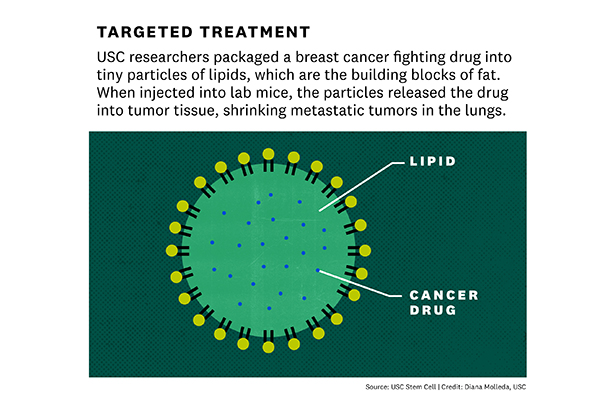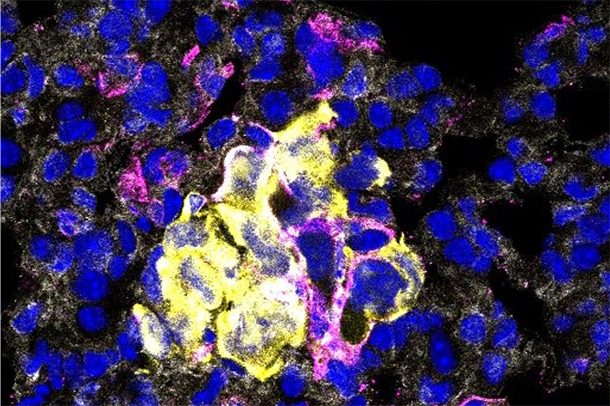USC Stem Cell researchers from the laboratory of Min Yu, MD, PhD, have positive news for patients with triple-negative breast cancer (TNBC), the most deadly type of breast cancer. By inhibiting a protein called TAK1, postdoctoral research associate at the Keck School of Medicine of USC, Oihana Iriondo, PhD, and her colleagues reduced lung metastases in mice with TNBC, as described in a new study in Nature Communications.
In the 20 percent of breast cancer patients with TNBC, it appears that TAK1 enables malignant cells from the breast to survive in the unique environment of the lungs, and form new metastatic tumors. Metastases are the most common cause of cancer-related death.
There’s already a potential drug, called 5Z-7-Oxozeaenol or OXO, that can inhibit TAK1 — and presumably make it much more difficult for breast cancers cells to form lung metastases. However, OXO is not stable in the blood and therefore wouldn’t work in patients.
To overcome this obstacle, Yu and her lab teamed up with the laboratory of Pin Wang, PhD, at the USC Viterbi School of Engineering. Wang’s team developed a nanoparticle — consisting of a tiny fatty sac — that can effectively carry drugs through the bloodstream and deliver them to tumors.
The scientists loaded this nanoparticle with OXO and used it to treat mice that had been injected with human breast cancer cells. While OXO did not shrink primary tumors in the breast, the potential drug greatly reduced metastatic tumors in the lungs — with minimal toxic side effects.
“For patients with triple-negative breast cancer, systemic chemotherapies are largely ineffective and highly toxic,” said Yu, an assistant professor of stem cell biology and regenerative medicine, and principal investigator at the Eli and Edythe Broad Center for Regenerative Medicine and Stem Cell Research, and the USC Norris Comprehensive Cancer Center. “So nanoparticles are a promising approach for delivering more targeted treatments, such as OXO, to stop the deadly process of metastasis.”
Additional co-authors include Grace Lee, Mostafa Elhodaky, Christian Jimenez, Lin Li, and Julie Lang from the Keck School, and Yarong Liu from USC Viterbi.
Funding came from the National Cancer Institute (K22 CA175228-01A, DP2CA206653, and P30CA014089) and the USC Ming Hsieh Institute for Engineering Medicine for Cancer.
— Cristy Lytal


